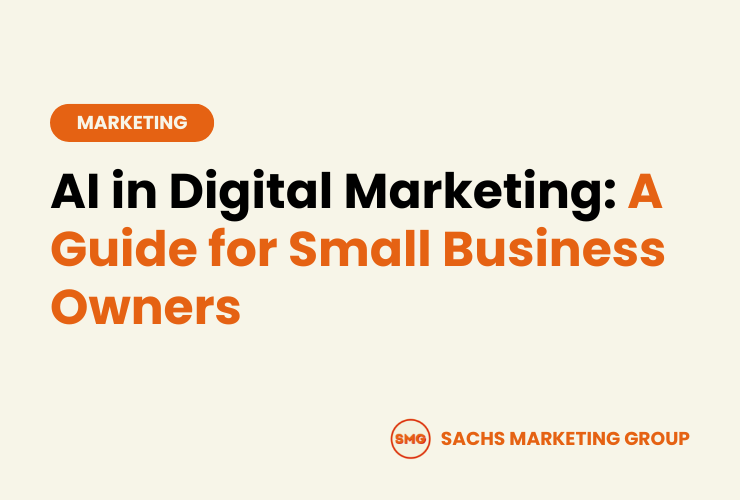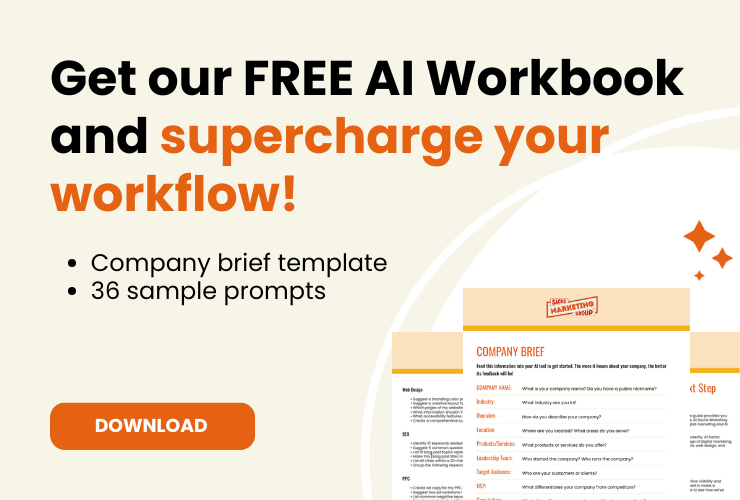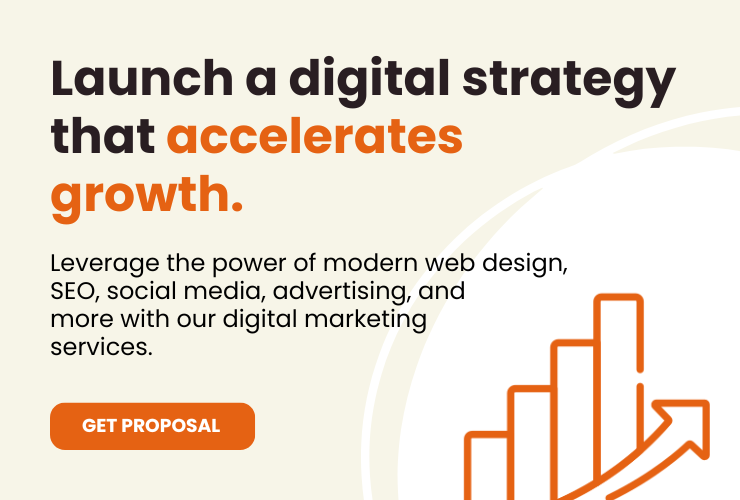AI in digital marketing is like a super-powered marketing assistant. Business owners can use AI for website design inspiration, certain areas of SEO research, content strategy, PPC ad targeting, social media calendar planning, reputation management, and customer service. It may not be able to provide specific data, but it can provide guidance that helps streamline your creative and strategic process.
Are you overwhelmed by the complexity and time demands of digital marketing?
AI in digital marketing can alleviate these challenges by streamlining your efforts and enhancing your strategies.
With AI tools, you can efficiently conduct research, generate creative ideas, and solve problems without losing the human touch. Imagine having an intelligent assistant that empowers you to focus on strategic growth and creative innovation.
This article explores AI in digital marketing and explains how to use AI for digital marketing assistance.
- AI as an Assistant, Not a Replacement: AI tools provide valuable support in generating ideas, solving problems, and planning strategies. However, they should enhance human creativity and insight, not replace them.
- Versatility Across Tasks: AI tools can streamline digital marketing activities, from generating content ideas and SEO research to PPC ad targeting suggestions and social media planning. They offer suggestions and insights that help marketers focus on their work’s more strategic and creative aspects.
- Balance Benefits with Risks: While AI tools offer numerous benefits, such as increased efficiency and enhanced targeting, they also come with risks like potential inaccuracies and loss of personal touch. Understanding these risks ensures a balanced approach that leverages AI’s strengths while maintaining human oversight.
Overview
AI in Digital Marketing: An Introduction
AI in digital marketing is revolutionizing how businesses approach their marketing strategies.
It’s essential to understand that AI is not a replacement for human marketers but a powerful tool that assists them in various tasks.
AI tools can perform extensive research, generate creative ideas, and troubleshoot issues efficiently, allowing marketers to focus on their campaigns’ more strategic and creative aspects.
Ultimately, AI in digital marketing empowers marketers to deliver more effective and engaging campaigns, driving better results without sacrificing the human touch crucial for connecting with audiences.
AI Tools
AI tools have become essential in today’s digital landscape, offering innovative solutions for various marketing, customer service, and content ideation tasks.
From conversational AIs to advanced search engines, these tools enhance efficiency and engagement.
Here are some of the most notable AI tools available today:
- ChatGPT by OpenAI
- Gemini by Google
- Copilot by Microsft
- Claud
- Perplexity
How to Use AI for Digital Marketing
AI in digital marketing offers numerous applications that can enhance your marketing efforts.
From web design inspiration to SEO research, AI tools can provide valuable assistance without replacing the human touch.
Here’s what you need to know about AI in digital marketing and how to use AI for digital marketing.
Web Design Inspiration
Finding fresh web design inspiration can be challenging. AI tools can assist by analyzing the latest trends, user preferences, and successful design elements from around the web.
These tools can suggest color schemes, layouts, and fonts that resonate with your audience, providing a solid foundation for your design.
They use machine learning to understand what works best in your industry, offering personalized recommendations that save you time and effort.
Additionally, AI can identify design elements that enhance user experience, ensuring your website is visually appealing and user-friendly. However, it is crucial to use AI as an assistant rather than a replacement.
While AI can handle data analysis and trend identification, your creative insight and understanding of your brand are irreplaceable. This combination ensures the final design looks good, genuinely reflects your brand, and effectively engages your visitors.
Related: 10 Questions to Ask When Redesigning a Website
SEO Research
SEO research is essential for improving your website’s visibility, but it can be time-consuming and complex. AI tools can help by mapping out entire topics and their sub-topics, revealing potential keyword ideas you might not have considered.
These tools can suggest relevant keywords for your industry, helping you target the right audience. AI can also offer insights into how competitors structure their content, highlighting areas where you can gain an edge.
While AI provides valuable guidance, it’s important to remember it offers suggestions rather than exact data. This is why using AI as an assistant or tool is important rather than a replacement. A professional SEO will investigate AI suggestions by cross-referencing them with actual data.
Combining AI insights with your knowledge of your audience and industry ensures a well-rounded and effective SEO strategy. You can streamline your SEO efforts by using AI as a research assistant.
Focus on creating content that truly resonates with your target market. This blend of AI and human expertise can significantly boost your search rankings.
Related: AI for SEO: 12 Ways to Use AI for Search Engine Optimization
Content Strategy
A robust content strategy is crucial for engaging your audience and driving traffic. AI tools excel at generating creative content ideas based on industry trends and audience behavior.
These tools can analyze current popular topics and suggest relevant themes for your content. This helps ensure your content remains fresh and engaging.
AI can also provide insights into the types of content that resonate most with your audience, such as blogs, videos, or infographics. You can maintain a steady stream of ideas by leveraging AI for content strategy without hitting a creative block.
While AI offers excellent ideas, your unique perspective and understanding of your audience are essential.
Combining AI-generated ideas with your creativity creates a content strategy that connects with your readers. This partnership between AI and human insight can lead to a more dynamic and compelling content plan.
Related: How to Develop a Blog Content Strategy
PPC Ad Targeting
Effective PPC ad targeting is essential for reaching the right audience and maximizing ad spend. AI tools can assist by offering insights into user behavior, demographics, and preferences, guiding you in creating more targeted ad campaigns.
These tools can suggest which audience segments will likely convert, helping refine your targeting strategy. They can also provide ideas for ad creatives that resonate with your target market.
While AI can help you craft targeted ads, it’s important to remember that these tools don’t directly access data sources. Instead, they offer valuable suggestions based on general trends and patterns. A professional PPC specialist will consider suggestions but follow the data provided by ad platforms, like Google Ads or Microsoft Advertising.
Use AI as a guide, and leverage your expertise to create compelling PPC ads. This way, you can optimize your campaigns and achieve better results without relying solely on AI.
Related: 14 Benefits of PPC Advertising for Rapid Growth
Social Media Calendars
Planning and maintaining a social media calendar for your social media marketing can be overwhelming. AI tools can help streamline this process by suggesting optimal posting times, content themes, and engagement strategies. They can analyze patterns in your audience’s behavior to recommend the best times to post and the types of content that will generate the most engagement.
These tools can also help you plan content, ensuring a consistent and cohesive social media presence. By leveraging AI for social media planning, you can save time and focus on creating engaging content.
While AI provides structure and recommendations, your unique voice and creativity are crucial.
This combination ensures your social media efforts remain authentic and compelling, enhancing your digital presence.
Related: How to Create a Social Media Content Calendar
Reputation Management
Maintaining a positive online reputation is vital for any business. AI tools can assist by monitoring online reviews, social media mentions, and customer feedback.
Even the best businesses receive the occasional negative review. Understanding how to respond to negative feedback is important and sensitive. AI can help provide some ideas for responses that demonstrate exceptional customer service.
AI can also suggest ways to encourage positive reviews and improve customer sentiment. By automating these processes, you can manage your online reputation more efficiently.
However, it’s essential to combine AI insights with a personal touch. While AI can handle monitoring and basic responses, personalized interactions show customers that you care. This balance can help you maintain a strong, positive reputation online.
Related: Why Online Reputation Management is Important
Customer Service
Providing excellent customer service is crucial for retaining customers and building loyalty. AI tools can assist by outlining basic customer service guidelines and suggesting automated responses for common queries. AI chatbots can handle routine inquiries, allowing your team to focus on more complex issues.
These tools can also provide insights into common customer issues, helping you improve your products or services. Using AI to streamline customer service can ensure faster and more efficient support.
However, human interaction remains essential for building strong customer relationships. Use AI to enhance your customer service efforts, but always be ready to provide a personal touch when needed. This approach ensures a balance of efficiency and empathy in your customer interactions.
The Benefits of AI in Digital Marketing
Using AI in digital marketing can offer several significant benefits. Here are some key benefits:
- Idea Generation: AI can help brainstorm creative ideas for content, campaigns, and strategies, providing fresh perspectives and inspiration.
- Efficiency: It can streamline various marketing tasks, such as drafting emails, social media posts, and blog articles, saving time and resources.
- 24/7 Availability: AI can assist with customer service and engagement anytime, providing immediate responses and support.
- Content Personalization: It can tailor content suggestions based on user data and preferences, enhancing personalization and relevance.
- Cost-Effective: Leveraging AI can reduce the need for extensive human resources, lowering operational costs while maintaining productivity.
- Consistency: AI ensures consistency in tone and messaging across different platforms and content pieces.
- Data Analysis: While not directly analyzing data, AI can interpret and present data insights in a user-friendly format, aiding in decision-making processes.
- Scalability: It can handle many inquiries and tasks simultaneously, supporting scalability in marketing operations.
By incorporating AI into digital marketing efforts, businesses can enhance creativity, improve efficiency, and provide better customer engagement, all while maintaining consistency and scalability.
Related: The Benefits of ChatGPT (And How it’s Reshaping Digital Marketing)
The Risks of AI in Digital Marketing
While AI in digital marketing offers many benefits, it also comes with potential risks that businesses should be aware of. Here are some key risks associated with using AI in digital marketing:
- Inaccuracy: AI can sometimes generate incorrect or misleading information, leading to marketing content and strategy mistakes.
- Loss of Authenticity: Over-reliance on AI might result in marketing messages that lack the personal touch and authenticity that human-created content provides.
- Bias: The model can reflect biases present in its training data, potentially leading to outputs that are not diverse or inclusive.
- Ethical Concerns: Using AI for customer interactions can raise ethical issues concerning data privacy and consent.
- Limited Understanding: AI might not fully understand the nuances of your brand, audience, or industry, resulting in less tailored and effective marketing messages.
- Dependence on AI: Heavy reliance on AI can diminish human creativity and critical thinking in marketing processes.
- Security Vulnerabilities: Integrating AI into marketing systems may introduce security risks if not properly managed.
Understanding these risks allows marketers to use AI judiciously, ensuring a balance between AI assistance and human oversight for effective digital marketing.
Professional Digital Marketing Enhanced with AI
Are you interested in launching a digital marketing campaign super-charged with AI assistance? Sachs Marketing Group is here to help!
As a full-service digital marketing agency, we provide everything from web design and SEO services to social media marketing and PPC ad management. Our team leverages AI-driven suggestions and research with human expertise to deliver personalized, effective marketing campaigns tailored to your business needs.
Contact us today and discover how we can help your business grow.
Conclusion
AI in digital marketing is a powerful ally for small business owners. By leveraging AI tools, you can enhance your marketing efforts, streamline processes, and focus on strategic growth. Embrace AI in digital marketing to stay ahead of the competition and achieve your business goals.
AI in digital marketing is a game-changer, offering innovative solutions for idea generation, problem-solving, and strategic planning.
By leveraging AI tools, businesses can enhance their marketing efforts, improving efficiency and creativity. However, balancing AI’s capabilities with human insight is crucial to maintaining authenticity and personal connection.
Understanding AI’s benefits and risks helps make informed decisions that optimize marketing strategies. As technology advances, the synergy between AI and human expertise will continue to shape the future of digital marketing. Embracing AI thoughtfully ensures a competitive edge and drives meaningful engagement with your audience.
Contact us today to get the conversation started!













